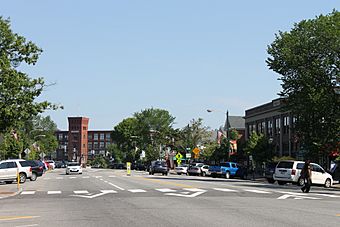Brunswick Commercial Historic District facts for kids
The Brunswick Commercial Historic District is a special part of Brunswick, Maine. It's like a time capsule showing what the town's main shopping area looked like in the late 1800s. This historic district covers the top four blocks of Maine Street. This street has been important since the late 1600s! In 2016, it was added to the National Register of Historic Places. This means it's a very important place to protect.
Contents
Exploring Brunswick's History
Brunswick has a long and interesting past. Its story began around 1688 with a place called Fort Andross. This fort was built near the Androscoggin River. From the fort, a wide road was created. This road led all the way to Maquoit Bay to the south. Today, we know this old road as Maine Street.
Brunswick officially became a town in 1737. In the early days, the town's economy grew thanks to mills along the river. Trade by sea was also very important. Later, in 1794, Bowdoin College was started. Its campus is just south of the main shopping area.
How Brunswick Grew Over Time
The mills in Brunswick became even bigger in the 1800s. This was especially true after the railroad arrived in 1849. The railroad made it easier to move goods and people. In the 1900s, the Brunswick Naval Air Station also helped the area's economy. It was located southeast of the downtown area.
What Makes the District Special?
The Brunswick Commercial Historic District includes the first four blocks of Maine Street. This means most of the buildings between Mill Street and Pleasant Street are part of it. These buildings are usually one or two stories tall. They are built from either brick or wood.
Architectural Styles You Can See
Many of the buildings here are in the Colonial Revival style. This style became popular in the late 1800s and early 1900s. It brought back designs from America's colonial past. You can also see some older styles from the 1800s.
Most of the buildings have shops on the ground floor. Above the shops, you might find offices or homes. One very cool building is the Lemont Block. It's at the corner of Maine and Pleasant Streets. This building is three stories tall and made of brick. It was built in 1870 and shows the Second Empire style.
 | Anna J. Cooper |
 | Mary McLeod Bethune |
 | Lillie Mae Bradford |




